Blog del Instituto Cervantes de Dublín
Torre Martello
[Video] Cecilia Gandarias habla sobre la exposición «Geografía Postal»
En la primera mitad del siglo XX, las familias García Lorca y De los Ríos se enviaban postales casi todos los días, creando así una amplísima colección que ahora se expone en el Instituto Cervantes. Cecilia Gandarias, comisaria de la exposición, nos habla de cómo surgió la idea para esta exposición y de como se realizó la selección de las postales.
La exposición estará abierta del 20/09/2012 al 17/11/2012.
El horario de visita es: Lun.- jue.: 14-19 h. Sáb: 10-14 h. Cerrado vie., dom. y festivos
In the first half of the 20th Century two families, García Lorca and De los Ríos, sent each other postcards almost daily. A selection of this huge collection of postcards is now on display at the Instituto Cervantes in Dublin. Cecilia Gandarias, exhibition curator, explains us in this video how they came to the idea of organizing this exhibition and how Martin Parr, photographer and specialist in postcards, made the selection.
This display will bring us closer to the most intimate side of the poet´s life.
The exhibition is open fro the 20/09/2012 to 17/11/2012.
Opening hours: Mon-Thur: 2-7pm. Sat: 10am-2pm. Closed on Fridays, Saturdays and Bank Holidays.
[Video] PhotoIreland y «El otro lado del alma» en el Instituto Cervantes de Dublín
El pasado 31 de agosto despedimos la exposición de PhotoIreland «El otro lado del alma» que nos acompañó en el Instituto Cervantes de Dublín durante cerca de dos meses. En esta entrevista, el comisario de esta exposición, Moritz Neumüller, nos explica los orígenes y los motivos de esta iniciativa.
En «El otro lado del alma» nos encontramos con una serie de fotógrafos contemporáneos cubanos que investigan la temática religiosa y en concreto las religiones sincretistas con raíces en los cultos africanos importadas a la isla hace cientos de años por esclavos, desde muy diferentes perspectivas, mostrando una interpretación individual sobre la memoria espiritual colectiva de la nación.
Aunque la fotografía y el videoarte cubano actual se mueven en la esfera de los movimientos internacionales, mucho de los artistas cubanos siguen mostrando en sus fotografías y en sus vídeos que la tradición cubana sigue estando profundamente arraigada en ellos. Así, en muchas de las obras que se producen actualmente podemos apreciar la influencia de una profunda temática cubana.
Last 31st August we said goodbye to the PhotoIreland exhibition “The other side of the soul”, which accompanied us in the Instituto Cervantes for about two months. In this video, Moritz Neumüller, curator of this exhibition, explained us the origins and reasons for this initiative.
This exhibition showcases various contemporary Cuban photographers who research religious themes and, specifically, syncretistic religions with roots in African cults that were imported in the island centuries ago by slaves. These photographers portray a personal interpretation of the collective spiritual memory of the nation from very different perspectives.
Although both Cuban photography and video art revolve around international movements, many Cuban artists still portray an ingrained Cuban tradition. We can therefore perceive a profound Cuban theme influence in many works produced at present.
Federico García Lorca: nuestro autor del mes de septiembre
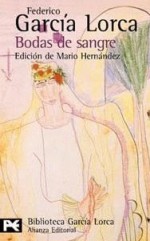 Desde el día 20 de este mes y hasta el 17 de noviembre contaremos en el Instituto con la exposición “Geografía postal. Las postales de las familias García Lorca y De los Ríos”.
Desde el día 20 de este mes y hasta el 17 de noviembre contaremos en el Instituto con la exposición “Geografía postal. Las postales de las familias García Lorca y De los Ríos”.
En la biblioteca, aprovechamos esta ocasión para recordar al que en la actualidad es el poeta español más leído de todos los tiempos. Fundamental es también su figura en el teatro español contemporáneo. En 1915 comienza a estudiar Filosofía y Letras y Derecho en la Universidad de Granada. Formó parte de El Rinconcillo, centro de reunión de los artistas granadinos donde conoce a Manuel de Falla quien ejerció una gran influencia en él, transmitiéndole su amor por el folclore y lo popular.
A partir de 1919, se instaló en Madrid, en la Residencia de Estudiantes, donde conoció a Juan Ramón Jiménez y a Machado, y trabó amistad con poetas de su generación y artistas como Buñuel o Dalí. En este ambiente, Lorca se dedicó con pasión no sólo a la poesía, sino también a la música y el dibujo, y empezó a interesarse por el teatro.
From the 20th of this month until the 17th of November, you can enjoy at the Institute the exhibition “Postal Geography. García Lorca and De los Ríos Families´s Postcards”.
At the library, we take the chance to remember the most read Spanish poet of all times. He is also an essential part of contemporary Spanish theatre. He started to study Philosophy and Literature and also took Law studies at the University of Granada. He was part of El Rinconcillo, a meeting point for the artists of Granada where he met Manuel de Falla who was a big influence, learning from him about folk and tradition .
In 1919 he moved to Madrid and lived in the Residence for Students, where he met Juan Ramón Jiménez and Machado and he became good friend of poets and artists of his generation such as Buñuel or Dalí. Lorca worked with passion in that environment in poems and also in music, drawing and he started to be interested in theatre.
Cine / Film screening: Familystrip
La última sesión del ciclo sobre memoria histórica nos llega hoy a las seis de la tarde en el Café Literario. La película se titula Familystrip y cuenta la historia de un joven pintor, Francisco Herrero, que pinta un retrato familiar: el del padre y la madre del productor, director y antiguo crítico cinematográfico Lluis Miñarro, quien con su presencia en el encuadre propone los temas de la charla.
Es un recorrido por una familia española típica, desde el franquismo hasta comienzos del siglo XXI, con una angustiosa vuelta de tuerca final. Con la elaboración del cuadro se nos revelará a una generación que desaparece: nuestros mayores. Estos dos supervivientes de la Guerra Civil y la posguerra, nos relatan sus más íntimos secretos que no son otros que la apuesta por la vida. Otra visión de nuestra memoria colectiva.
The last film of the historical memory series is today at 6pm at Café Literario. Luis Miñarro uses the story of one elderly couple to show how a generation of Spaniards were forced to struggle with war and fascism in this documentary. Miñarro paid a visit to his parents in the Catalan village where he was raised as they were preparing to celebrate their 65th wedding anniversary.
As his mother and father discussed their lives and the events that shapes their nation, Miñarro brought in a small camera crew to capture their reminiscences on film, and in Familystrip they talk at length about living through the Spanish Civil War, the rule of Franco and World War II, as well as the impact of Catholicism, and how these elements at once tested their strength and robbed them of friends and family while also teaching them to be strong and survive into the 21st Century.
Cine y coloquio / Film screening + QA: Cambio climático: El impacto en España
El Instituto Cervantes Dublín se complace en presentar a la periodista Montserrat Domínguez, directora del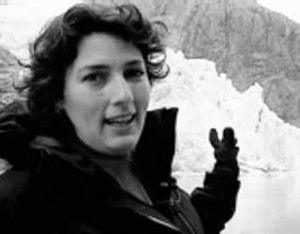 documental Cambio Climático: el impacto en España. La reconocida periodista presentará hoy a las seis, en el Café Literario, este documental y responderá a las preguntas del público tras la proyección.
documental Cambio Climático: el impacto en España. La reconocida periodista presentará hoy a las seis, en el Café Literario, este documental y responderá a las preguntas del público tras la proyección.
Seguro que ya conocéis el concepto de cambio climático, ese aumento de temperatura de la Tierra debido a la emisión de gases que afectan al estado de la atmósfera.
A través de la voz de diferentes científicos, marineros y agricultores, el documental se detiene específicamente en los intensos efectos que está teniendo este fenómeno en España, apelando a la conciencia y a la adopción de medidas.
El documental fue estrenado en 2007 con la finalidad de mostrar cómo el cambio climático afecta a España y cuáles son sus consecuencias más devastadoras.
Montserrat Domínguez ha sido directora de A vivir que son dos días, uno de los más destacados espacios de la parrilla radiofónica del fin de semana. Recientemente ha sido nombrada directora en España del Huffington Post, popular portal estadounidense de noticias y opinión, cuyo lanzamiento en lengua española acaba de tener lugar.
Durante su larga carrera en los medios de comunicación, ha trabajado para diferentes medios de comunicación, Antena 3, Telecinco o la Agencia EFE. Fue tras su paso por el programa La Mirada Crítica, de Antena 3, cuando dirigió el documental Cambio Climático: el impacto en España.
Instituto Cervantes Dublin is pleased to announce that the reporter Montserrat Domínguez will join us to introduce her documentary Cambio Climático: el impacto en España (Climate change: impact in Spain). The event will be today at 6pm at Café Literario.
Global warming is a familiar concept nowadays. It defines the increase in the Earth temperature due to greenhouse gas emissions that in turn have an effect on the climate.
This documentary raises awareness of the acute effects of this problem in Spain through the voice of scientists, sailors and farmers and appeals to consciences urging everyone to take meassures to counteract it. This one-hour film was first screened in 2007 to highlight the effects and devastating consequences of global warming in Spain.
Montserrat Domínguez is a well known Spanish reporter who has directed the weekend radio programme A vivir que son dos días (Life is too short, make the most of it!). She has recently been appointed director of The Huffington Post, a popular American online news journal that will be launched in Spanish in June 2012. She has worked in various news media throughout her long career, in Antena 3, Telecinco or Agencia EFE. She directed the documentary Cambio Climático: el impacto en España when she worked for the programme La Mirada Crítica (A critical view) of the Spanish television channel Antena 3.
Montserrat Domínguez will introduce this documentary and will host a questions and answers session.
El día E en la biblioteca / El Día E in the library
 Quedan veinticuatro horas para que de comienzo El día E, la fiesta de todos los que hablamos español. Ese día, mañana, la biblioteca estará abierta en su horario habitual los sábados, de 9:30 a 14:00.
Quedan veinticuatro horas para que de comienzo El día E, la fiesta de todos los que hablamos español. Ese día, mañana, la biblioteca estará abierta en su horario habitual los sábados, de 9:30 a 14:00.
Sin embargo, a partir de las 15:30 volverá a abrir hasta las 17:00 con un bazar de libros en el que ofreceremos libros completamente nuevos a muy buenos precios. Todos ellos en español y, casi todos ellos, de literatura española e hispanoamericana. Puedes llevarte un libro por 5 euros o ¡3 libros por diez euros!
Además, a los que vengáis a la biblioteca entre las 15:30 y las 17:00 os ofreceremos el carné de la biblioteca completamente gratis por seis meses. ¡Solo a los que vengáis durante esa hora y media!
¿Y qué más? A lo largo del día, en nuestro café literario y en nuestra sala de exposiciones podrás disfrutar de un concurso de tortilla de patata, de la buena comida española y latinoamericana, de una fiesta latina, o de clases gratuitas de español y de tango. ¿Se nos olvida algo? Por si acaso, aquí tienes el programa completo.
Just Twenty-four hours left to ElDíaE, la fiesta de todos los que hablamos español. That day, tomorrow, the library will be open as usual on Saturdays from 9:30 to 14:00.
However, we will re-open at 15:30 until 17:00 with a market of books which offer brand new books at great prices. All of them in Spanish and almost all of them, Spanish and Latin American literature. You can take a book for 5 Euros or 3 books for ten euros!
In addition, for those who visit the library between 15:30 and 17:00 we will offer the library membership card free for six months. Only for those coming during that hour and a half!
And what else? Throughout the day, in our Café Literario and in our showroom, you can enjoy an Spanish omelette competition, good Spanish and Latin American food, a Latin fiesta, or free Spanish classes and tango workshop. Did we forget something? Just in case, here’s the whole programme..
Cine | Film screening: El tren de la memoria
Durante los años 60, dos millones de españoles salieron del país empujados por la necesidad. Su destino: Alemania, Francia, Suiza y los Países Bajos. La mitad eran clandestinos y viajaban sin contratos de trabajo. El ochenta por ciento analfabetos.
Ante ellos se levanta el muro del idioma y las costumbres diferentes. Otros necesitados llaman a la puerta de un país próspero. Casi nadie se acuerda de la otra historia. Pero a través de la película documental “El tren de la memoria” de las cineastas Marta Arribas y Ana Pérez se narra esta emigración masiva a través de un puzzle realizado con el archivo de grabaciones de aquellos años y los testimonios actuales de los propios emigrantes.
Así tenemos la oportunidad de conocer las duras condiciones que obligaron a tantos españoles a abandonar sus granjas y pueblos a la búsqueda de trabajo y la fría recepción que en muchas ocasiones recibieron a su llegada. La película es hoy a las 6pm en nuestro Café Literario dentro del ciclo dedicado a la memoria histórica.
In the 1960s, almost two million Spaniards left Spain in search of work in France, the Netherlands, Switzerland and especially West Germany. Poor, unskilled and largely illiterate, many traveled clandestinely; other left with contracts for work in factories and other industrial establishments.
Most thought they´d stay abroad for a matter of months, or possibly a year; many wound up settling in these countries for the rest of their lives. The story of this massive emigration has now finally been told by filmmakers Marta Arribas and Ana Pérez; piecing together extraordinary archival footage along with testimony by the emigrants themselves,
“The Train of Memory” recounts the harsh conditions that forced so many Spaniards to abandon their farms and villages in search of work, as well as the often less than welcoming reception many received upon arriving at their destinations. The film is today at 6pm at Café Literario as part of the film series focusingd on the historical memory.
El día E / The Día E
 El próximo 23 de junio, el Instituto Cervantes celebrará la cuarta edición del Día del E: la fiesta de todos los que hablamos español, una fiesta a nivel mundial, que se celebra simultáneamente en todos los centros de la red Cervantes.
El próximo 23 de junio, el Instituto Cervantes celebrará la cuarta edición del Día del E: la fiesta de todos los que hablamos español, una fiesta a nivel mundial, que se celebra simultáneamente en todos los centros de la red Cervantes.
Para celebrar la diversidad e internacionalidad del español, los más de 70 centros del Instituto Cervantes abrirán de nuevo sus puertas con un sinfín de propuestas.
Te invitamos a vivir la fiesta del español con nosotros en un día abierto a todos los públicos. ¡Anímate y ven a celebrarla con nosotros!
This coming 23rd June, Instituto Cervantes will hold the 4th edition of the Día E, a worldwide celebration, which will take place simultaneously in all of the centres in the Cervantes network.
The Día E was created to commemorate and celebrate the importance of Spanish as an international language, with already more than 450 million speakers across the world.
To celebrate this diversity, the Instituto Cervantes centres will once again welcome the public with no end of activities.
Cine / Film screening: Silencio roto
La historia: Invierno de 1944. Lucía una joven de 21 años, regresa a un pequeño pueblo de montaña. Allí encuentra a Manuel, un joven herrero que colabora con los maquis: guerrilleros que, ocultos en la sierra, no se resignan al triunfo del franquismo.
Estas circunstancias harán que Lucía se sienta atraída por Manuel, sobre todo por el valor que muestra al jugarse la vida con tal de defender sus ideas.
Cuando, por fin, Manuel se echa al monte, Lucía descubre la inhóspita realidad de la vida en la montaña: por las vacías calles del pueblo sólo deambulan el silencio, el horror y el miedo. A pesar de ello, su pasión por Manuel la anima a permanecer allí.
The story: Winter, 1944. Lucía at 21 returns to her small village in the mountains. She again meets Manuel, a young iron-smith who helps “those in the mountain”, the “maquis”, the anti-Franco resistance.
Lucía is attracted to Manuel, because of his smile and the bravery of those men who continue fighting for their ideas, even at the cost of their own lives.
When Manuel is pursued (by Franco’s Civil Guard) he flees to the mountain and Lucía discovers the reality of political repression, the silence, the horror and fear.
Aquí llega el día E / El día E is coming
El día E estrena logo y página web. Y como estamos de moda, para estrenarlo, sus creadores han decidido poner en portada un video de Ian Gibson explicando cuál es su palabra favorita. ¿Adivinas cuál es?
El día E, la fiesta de todos los que hablamos español, se celebra este año el próximo 23 de junio con centenares de actividades culturales repartidas por toda la red de centros del Instituto Cervantes en el mundo.
En Dublín, contaremos con música, comida latina, clases de español gratuitas, un concurso de tortilla de patatas, un bazar de libros y otras actividades. Aquí podéis descargar el programa completo de actividades. Os esperamos.
El día E launches logo and website. As we fashion, for this premiere, the website creators have decided to embed a video of Ian Gibson explaining his favorite word in Spanish. Can you guess what is it?
El día E is a celebration day for all those who speak Spanish. This year it takes place the 23rd June with hundreds of cultural events spread throughout the Instituto Cervantes centres all over the world.
In Dublin, we will have music, Latin food, free Spanish lessons, a tortilla de patatas contest, a books’ market and many other activities. See you all there!
El hombre que se atrevió a soñar / The man who dared to dream
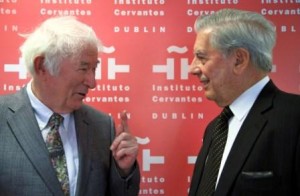 Hoy hemos recibido a Mario Vargas Llosa en el Instituto Cervantes de Dublín. El premio Nobel de Literatura 2010 ha charlado con Juan Cruz ante más de doscientas personas acerca de su última novela, El sueño del celta y su protagonista, Roger Casement.
Hoy hemos recibido a Mario Vargas Llosa en el Instituto Cervantes de Dublín. El premio Nobel de Literatura 2010 ha charlado con Juan Cruz ante más de doscientas personas acerca de su última novela, El sueño del celta y su protagonista, Roger Casement.
Durante la velada, también hubo tiempo para reflexionar acerca de la banalización de la cultura, a propósito de la reciente publicación del libro de ensayo de Vargas Llosa que lleva por título La civilización del espectáculo, y por supuesto para saludar y conversar con su viejo amigo, Seamus Heaney.
El pasado fin de semana se publicó en el Irish Times una elogiosa crítica de El sueño del celta, publicado en inglés por Faber and Faber. El resumen de la conferencia que retransmitimos a través de twitter se puede consultar en: http://storify.com/icdublin/en
Tonight Instituto Cervantes Dublin hosted Mario Vargas Llosa. Over 200 guests listened to the laureate of the 2010 Nobel Prize in Literature chat to Juan Cruz about his recent novel “The Dream of the Celt” and its protagonist Roger Casement.
During the evening there was also an occasion to reflect on trivialization of culture, alluding to Vargas Llosa’s recent book of essays “Civilization of the spectacle”, and to say hello to his old friend Seamus Heaney.
Last weekend The Irish Times featured a laudatory review on The Dream of the Celt published in English by Faber & Faber. The conference transmitted live on twitter is available here: http://storify.com/icdublin/en
Charla: Honor, intimidad y presunción de inocencia contra la libertad de prensa | Talk: Honour, Privacy and Presumption of Innocence against Freedom of Speech
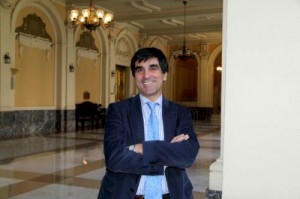 El Instituto Cervantes Dublín te invita a asistir hoy a las seis en el Café Literario a la conferencia impartida por Antonio del Moral en la que se tratarán temas como la justicia y la libertad de prensa, dos de los principales valores de una sociedad desarrollada.
El Instituto Cervantes Dublín te invita a asistir hoy a las seis en el Café Literario a la conferencia impartida por Antonio del Moral en la que se tratarán temas como la justicia y la libertad de prensa, dos de los principales valores de una sociedad desarrollada.
Se hablará también del honor, la buena reputación de las personas, de la intimidad como parcela que todo individuo quiere preservar del resto de los seres humanos e incluso del principio de inocencia, un principio jurídico penal que establece como regla la inocencia de toda persona, pudiéndose aplicar un castigo solamente si después de un proceso o juicio se demuestra la culpabilidad de la persona.
Antonio del Moral (Doctor en Derecho por la Universidad Complutense de Madrid, profesor de Derecho Penal Económico y Fiscal del Tribunal Supremo) es una de las voces más autorizadas para hablar de los cambios normativos en la reforma del Código Penal.
Instituto Cervantes Dublin invites you to attend a conference by Antonio del Moral. This conference will deal with topics such as justice and freedom of speech, two of the main values of a developed society. It will be held today at 6pm at Café Literario.
This gathering will also deal with the concepts of honour, people’s reputation and intimacy as the space that every individual wishes to protect from the rest of the world (priceless for public figures who are exposed to audiences and press) or even the principle of presumption of innocence.This principle defines a legal term that establishes the innocence of every individual so that punishment can only be applied following a judicial process that demonstrates their guilt.
Antonio del Moral holds a Law degree and a Doctorate by the Complutense University of Madrid. He is professor of Financial Criminal Law and a Judge of the Spanish Supreme Court. He is an authority on the changes taking place on the reform of the Spanish Criminal Code.
Cine / Film screening: Canciones para después de una guerra
Hoy inauguramos un ciclo de cine en el que a través de cuatro películas nos adentramos en la memoria histórica, un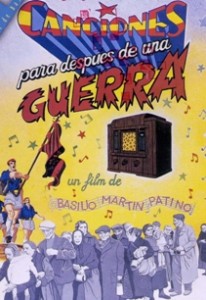 concepto que refleja el esfuerzo de todo grupo humano para conocer su pasado, su historia, y así comprender su presente.
concepto que refleja el esfuerzo de todo grupo humano para conocer su pasado, su historia, y así comprender su presente.
En España, esa búsqueda de la memoria histórica queda centrada en la guerra civil y en la represión franquista. Así que si te interesa conocer de forma más directa el caso español, no puedes perderte este ciclo de películas.
La proyección de hoy es “Canciones para después de una guerra”, una película documental basada en la España de posguerra. Se realizó de forma clandestina en 1971 y no fue estrenada hasta 1976, poco después de la muerte de Francisco Franco. La película consiste en una serie de imágenes de archivo, todas ellas previamente aprobadas por la censura, sobre las que se superponen canciones populares de la época con el fin de dar un segundo significado, a menudo satírico, a lo que se muestra en pantalla.
Te esperamos a las seis de la tarde en el Café Literario.
Instituto Cervantes invites you to an interesting series of four films focusing on the Historical memory. A concept that embodies the effort of a human group to understand its past and its history in order to understand its present.
In Spain, this search for our Historic memory hones in on the Spanish civil war and the Francoist repression.
Homenaje a Félix Romeo | Tribute to Félix Romeo
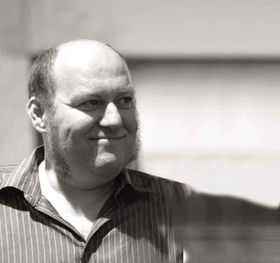 El Instituto Cervantes quiere acercarte la figura del escritor Félix Romeo (1968-2011). Para ello vamos a llevar a cabo, a modo de homenaje, una mesa redonda con cinco invitados que nos hablarán en primera persona de su relación con el prolífico escritor. La cita es hoy martes a las seis de la tarde en el Café Literario.
El Instituto Cervantes quiere acercarte la figura del escritor Félix Romeo (1968-2011). Para ello vamos a llevar a cabo, a modo de homenaje, una mesa redonda con cinco invitados que nos hablarán en primera persona de su relación con el prolífico escritor. La cita es hoy martes a las seis de la tarde en el Café Literario.
Nacido en Zaragoza, Félix Romeo fue novelista, columnista, crítico literario y traductor. Es una figura clave en el mundo literario español y destacó por su labor en la difusión y promoción de la cultura. Colaboró en distintos periódicos y suplementos culturales y fue director del programa cultural La Mandrágora. Como escritor destacan sus obras Dibujos Animados, Amarillo y Discothèque.
Miguel Aguilar (Madrid) es director literario de la editorial Debate y traductor.
Luis Alegre (Lechago, Teruel, 1962) polifacético escritor, periodista, cineasta, y presentador de televisión, ha recibido múltiples reconocimientos como personalidad imprescindible del cine español.
Ignacio Martínez de Pisón (Zaragoza, 1960), escritor de novela y narración corta y guionista. Sus obras han sido galardonadas con los premios Rodolfo Walsh y Dulce Chacón y ha sido aclamado por la crítica de varios países europeos.
Malcolm Otero Barrall (Barcelona, 1973) es editor, columnista y escritor. Ha sido profesor de literatura en diversos centros universitarios y es conferenciante habitual. Es miembro de la Orden del Finnegans, orden que tiene como objeto la veneración del Ulysses de James Joyce cada 16 de junio (Bloomsday).
David Trueba (Madrid, 1969) es uno de los jóvenes talentos del cine español que ha trabajado también como actor, guionista, escritor y periodista.
Instituto Cervantes wishes to bring you closer to the figure of writer Félix Romeo (1968-2011). We invite you to this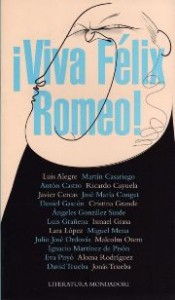 round table, as a tribute to Félix Romeo, where five guests will discuss their relationship with this prolific author. The event is today at 6pm at Café Literario.
round table, as a tribute to Félix Romeo, where five guests will discuss their relationship with this prolific author. The event is today at 6pm at Café Literario.
Félix Romeo, born in Zaragoza, was a novelist, columnist, literary critic and translator. He is a key figure in the world of Spanish literature and he stood out for his work in the promotion of culture. He published work in various newspapers and cultural supplements and was director of the Spanish cultural television programme La Mandrágora. As a writer, it is worth mentioning his work Dibujos Animados, Amarillo and Discothèque.
Miguel Aguilar is director of Debate Publishing House and translator.
Luis Alegre (Lechago, Teruel, 1962) is a versatile writer, journalist, film maker and television presenter. He has received various awards in recognition of his invaluable contribution to Spanish cinema.
Ignacio Martínez de Pisón (Zaragoza, 1960), his work as a writer has achieved recognition with the awards Rodolfo Walsh and Dulce Chacón and received outstanding critic’s reviews from various European countries.
Malcolm Otero Barrall (Barcelona, 1973) is an editor, journalist and writer. He has taught literature in various universities and is often invited as a guest speaker at conferences. He is a member of the The Order of Finnegans, an association that commemorates James Joyce Ulysses on Bloomsday (16th June).
David Trueba (Madrid, 1969) is one of the young talents of Spanish cinema. He has also worked as an actor, script writer, writer and journalist.
Presentación de libro / Book launch: La Roja: Lo que pudo ser y también fue España / What Spain could have been and it was: La Roja
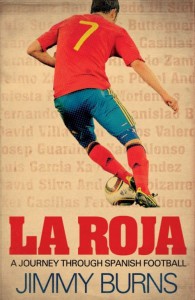 Empezamos la actividad cultural de la semana con la presentación, hoy lunes, a las seis, en el Café Literario, de La Roja, la última obra del premiado autor y periodista anglo-español Jimmy Burns Marañón.
Empezamos la actividad cultural de la semana con la presentación, hoy lunes, a las seis, en el Café Literario, de La Roja, la última obra del premiado autor y periodista anglo-español Jimmy Burns Marañón.
La Roja es tal vez uno de sus más ambiciosos libros, puesto que va mucho más allá de una simple narración de la historia del futbol en España para ofrecernos una visión controvertida de la transformación social, política, y cultural de España en los últimos cien años.
Con una perceptiva única, inteligente, provocativa, y objetiva que le da su doble nacionalidad y legado ilustre, Burns Marañón invita al lector a acompañarle en un viaje al corazón y alma de un país de Norte a Sur y de Sur a Norte. Saliendo un día de su casa londinense y tomando el tren para el aeropuerto de Gatwick, Burns Marañón se encuentra a pocas horas investigando una etapa oscura y violenta del colonialismo británico en las minas de Río Tinto. El autor atraviesa Andalucía, pasando por el barrio de Triana en Sevilla, entre vírgenes, toreros y poetas, y siguiendo otra pista, entre castellanos y catalanes – culés y madridistas – que le lleva al País Vasco. Allí descubre las ambigüedades de ciertos nacionalismos.
Podía ser una novela, pero no lo es. Podía ser un libro de viajes, pero no lo es. Podía ser un libro sobre fútbol pero no lo es. Es todo esto y mucho más. No importa si eres futbolero o no, este es un libro que todos deberían leer para saber más de un país que no se acaba nunca.
The cultural activity starts this week with the book launch today at 6pm at Café Literario of La Roja, the most recent work of the Anglo-Spanish prize-winning author and journalist, Jimmy Burns Marañón. It is perhaps one of his most ambitious books, and one which goes much further than a simple narrative of the history of Spanish football. It offers a controversial perspective on the social, political, and cultural transformation of Spain during the last hundred years.
With the unique, intelligent, provocative, and objective perception of his dual nationality and eminent background, Burns Marañón invites the reader to accompany him on a journey to the heart and soul of a country from north to south and south to north. Leaving his London home one day and taking the train to Gatwick Airport, within a few hours he finds himself exploring an obscure and violent episode in British colonialism in the mines of Río Tinto. The author travels across Andalucía, passing through the district of Triana in Sevilla, among Holy Virgins, bull-fighters, and poets and, following another trail between Castilians and Catalans, between fans of Barcelona and followers of Madrid, he comes to the Basque country, where he discovers the ambiguities of certain nationalisms.
It could have been a novel, a book of travel, a book about football, but it is none of these and all of these, and a great deal more. It does not matter whether or not you are a football fan, it is a book which all should read in order to know more about a country they believe they know.




